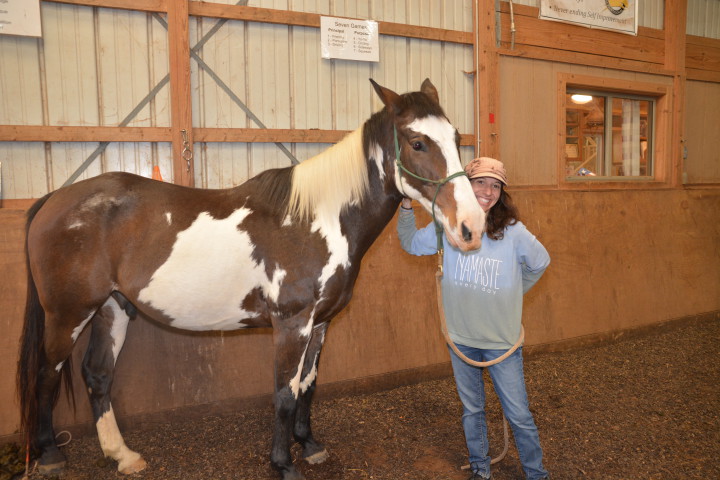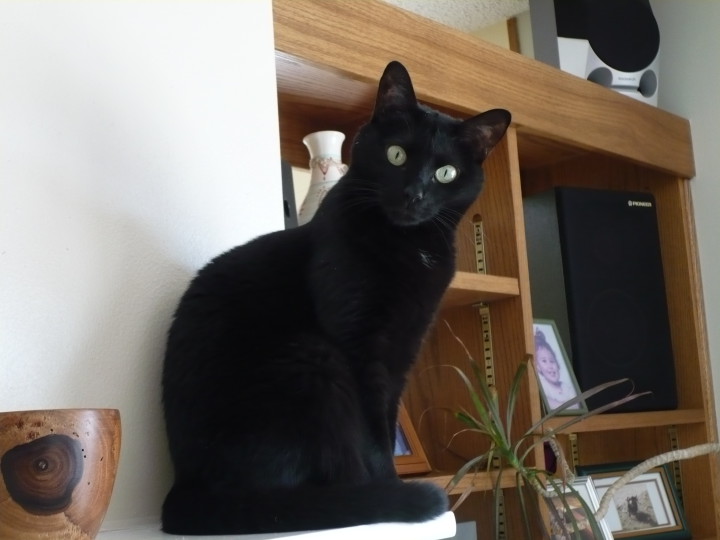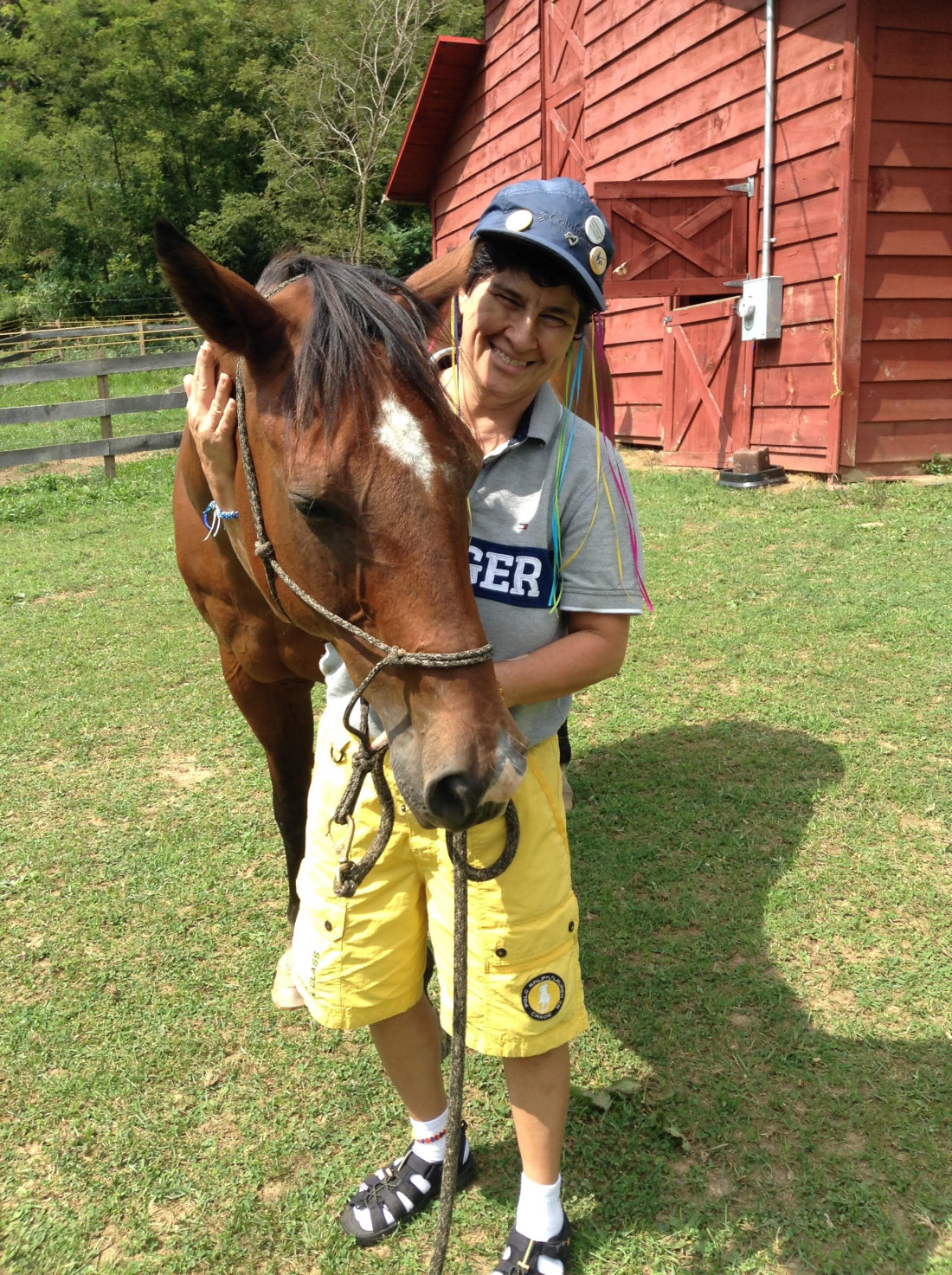TJ Amos says that after a childhood filled with unspeakable abuse, she decided on a career as a psychotherapist so she could help others overcome the type of trauma she had experienced.
Then she met the “perfect partner,” and they began planning a life together. But before it had barely begun, her fiancé was killed in the twin towers on 9/11.
That’s when everything fell apart. Unable to function, suffering frequent flashbacks, Amos moved from California to Asheville to escape the memories.
But the memories came along with her, tormenting her, disabling her — even interfering with her ability to parent her two children. She was unable to work because of the trauma.
Intensive psychotherapy helped, along with hospitalizations to stabilize the medications that helped keep her demons at bay.
Eventually, she signed on for horse therapy.
As a therapist herself, she understood how the horse therapy worked on an intellectual level, but she was surprised at the reality — at how much comfort she took in the way the horse seemed to understand what she needed but also how much effort it took on her part to interact with the horse and engage it.
“I’ve always had pets,” Amos says. “I’ve had cats, dogs, even horses. But horse therapy was something different. … There are some things that, no matter how much you talk about them, they get stuck in the grooves of your brain, and talking won’t dislodge them. This helped me understand how that was working against me.”
Amos did her horse therapy at Horse Sense of the Carolinas in Marshall, where some of the horses are working through their own trust issues, says Talia T. Aguayo Bermúdez, a licensed marriage and family therapist and clinical director at the farm.
“There’s no judgment from the horse,” Aguayo Bermúdez says. “The horse doesn’t care where you’ve been, who you are, what you’re wearing or how much money you have. It’s about who you are, right here, right now.”
The horses are rescues — retirees from police departments or horses that have suffered beatings or neglect from their previous owners. The horses and people build trust together, forge relationships and learn to adapt to each other’s needs. For many, this trust transfers to human relationships.

“If you come on too strong, they back off, but if you come back, it’s a new start. That trial-and-error helps people establish and understand boundaries,” Aguayo Bermúdez says.
Other professions are also relying on animals to improve human health.
At CarePartners, dogs help humans through physical therapy that often is demanding, exhausting and painful.
Physical therapist Jeff Scoltock says animals help people focus on something other than themselves. When a dog is involved, he says, the patient often can hold their balance longer or toss a ball farther with less pain. Putting a leash on a dog uses fine motor skills that might have been lost to stroke or traumatic brain injury.
“It’s often more difficult to do simple tasks when a dog is involved because the patient has to be aware of where the dog is and careful not to get tangled in the leash or trip over the animal. Yet still, patients do better with the dog than without,” Scoltock says.
For decades, science has been uncovering the benefits of relationships between people and animals. Interacting with animals helps to lower blood pressure, blood cholesterol, heart rate, stress levels and pain. An April article in Time magazine cites several studies that find human-animal relationships improve both physical and emotional health.
Physicians and hospitals are finding that the benefits of having dogs and cats visit patients outweigh the risks of infections or other problems, Scoltock says. Trained support animals have become part of the care for both adults and children, who are helped through treatments that are often painful but necessary.
“There’s a soothing quality,” Scoltock says. “We see less pain, increased ability to do things they couldn’t do before, lower blood pressure and heart rate and an increased sense of well-being.”
In a 2003 study in the journal Anxiety, Stress, & Coping, some people were asked to pet a rabbit, others a turtle and still others a plush toy. People who interacted with the live animals saw benefits such as lower blood pressure and heart rate, while those who interacted with plush toys saw none of the benefits.
And the animals don’t have to be furry or even able to interact. Simply caring for a living thing has benefits, as evidenced by a 2016 study in the journal Gerontology in which elderly people were given caged crickets. At the end of the eight-week study, those people who had cared for crickets were less depressed than people who had not.
Both Scoltock and Aguayo Bermúdez say they have witnessed the powerful effect that animals have on children and adults with developmental disabilities such as autism.
“They don’t even think about what they’re doing because the dog is there, and suddenly they can maintain their balance longer or maintain eye contact,” Scoltock says.
And people who have experienced trauma learn to calm their brains down by interacting with the horse, Aguayo Bermúdez says.
“Horses have a trauma brain because they are prey animals,” she says. “They have to stay alert and ready to run in the wild. So, here on the farm, they’re learning to use their upper brains — to think instead of react — just like a human who has experienced trauma.”
But animals can impart benefits to healthy, nondisabled people as well.
Take the case of Cindy Heil, who lives in Enka with a black cat named Sofia Noire, one of a litter brought into her office by her boss’s daughter in 2009.

“I’d always had dogs, but now I live in a place that doesn’t allow dogs,” Heil says. “So, I was going to get this cat, and she was going to be an indoor cat, a sort of roommate who would go her own way as I went mine.”
Of course, that’s not quite how it worked out.
“She took ownership of me, of the apartment,” Heil says. “Sofia is my family.”
On a bad day, Sofia is a reassuring presence, not challenging Heil on her views or asking anything more than a warm place to sleep and food and water. In return, she cuddles and purrs and accepts Heil’s love unconditionally.
“I feel so sorry for anyone who’s never had a pet,” Heil says. “They’ll never know that unconditional love because you’ll never get it from another human.”



Before you comment
The comments section is here to provide a platform for civil dialogue on the issues we face together as a local community. Xpress is committed to offering this platform for all voices, but when the tone of the discussion gets nasty or strays off topic, we believe many people choose not to participate. Xpress editors are determined to moderate comments to ensure a constructive interchange is maintained. All comments judged not to be in keeping with the spirit of civil discourse will be removed and repeat violators will be banned. See here for our terms of service. Thank you for being part of this effort to promote respectful discussion.